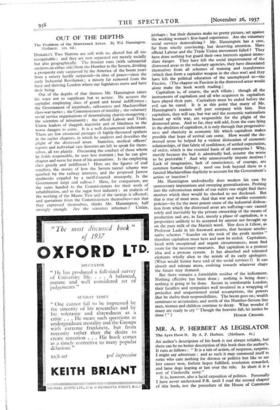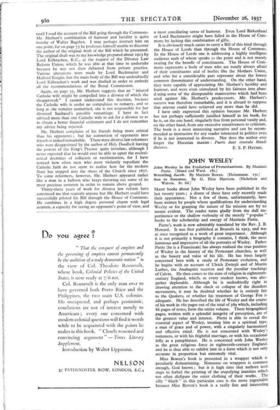MR. A. P. HERBERT AS LEGISLATOR
The Ayes Have It. By A. P. Herbert. (Methuen. 6s.)
AN author's description of his book is not always reliable, but there can be no better description of this book than the author's. It runs as follows : " It is a tale of action, of suspense, surprise, I might say adventure : and as such it may commend itself to some who care nothing for divorce or politics but like to see lost causes won, forlorn hopes fulfilled, resolution rewarded, and lame dogs leaping at last over the stile. In short it is a sort of Cinderella story."
It is, however, also a lucid exposition of politics. Personally I have never understood P.R. until I read the second chapter of this book, nor the procedure of the House of Commons
until I read the account of the Bill going through the Commons. Mr. Herbert's combination of humour and lucidity is quite worthy of Walter Bagehot. I may perhaps instruct him on one point, for on page 53 he professes himself unable to discover the author of the original draft of the Bill which he presented. The original draft was to my knowledge prepared about 1913 by Lord Kilbracken, K.C., at the request of the Divorce Law Reform Union, which he was able at that time to undertake because he was not then debarred from private practice. Various alterations were made by Lord Buckmaster and Holford Knight, but the main body of the Bill was undoubtedly Lord Kilbracken's work and was drafted in order to embody all the recommendations of the Royal Commission.
Again, on page 55, Mr. Herbert suggests that an " injured Catholic wife might be compelled into a divorce of which she disapproved." I cannot understand this doctrine, because the Catholic wife is under no compulsion to remarry, and so long as she remains unmarried, she is not responsible for her divorced husband's possible remarriage. I have in fact advised more than one Catholic wife to ask for a divorce so as to obtain a better financial settlement and I do not remember my advice being rejected.
Mr. Herbert complains of his friends being more critical than his opponents ; but his conversion of opponents into friends is indeed remarkable. There were divorce law reformers who were disappointed by the author of Holy Deadlock leaving the powers of the King's Proctor quite inviolate, although I never expected that he would ever be able to upset the ecclesi- astical doctrines of collusion or recrimination, for I have noticed how often men who most violently repudiate the Catholic faith do not seem to realise how far the modern State has stepped into the shoes of the Church since 1857. To some reformers, however, Mr. Herbert atipeared rather like a man in a balloon who keeps throwing out some of its most precious contents in order to remain above ground.
Thirty-three years of work for divorce law reform have convinced me that scarcely anyone but Mr. Herbert could have successfully piloted his Bill through the House of Commons. He combines in a high degree personal charm with legal acumen, a capacity for seeing an opponent's point of view, and
a most conciliating sense of humour. Even Lord Birkenhead or Lord Buckmaster might have failed in the House of Com- mons by lacking this combination of gifts.
It is obviously much easier to carry a Bill of this kind through the House of Lords than through the House of Commons. In the House of Lords one is addressing a highly intelligent audience each of whom speaks to the point and is not merely orating for the benefit of constituents. The House of Com- mons represents a body of men who are nearly always afraid of their constituents and of bodies like the Mothers Union, and who for a considerable part represent about the lowest common denominator of understanding. • On the other hand, they were capable of appreciating Mr. Herbert's lucidity and humour, and were even stimulated by his fairness intn_aban- d ming some of the disreputable manoeuvres which had been used against Mr. Herbert's predecessors. Mr. Herbert's success was therefore remarkable, and it is absurd to suppose that anyone could have achieved any more than he did.
I have only expressed this opinion because Mr. Herbert has not perhaps sufficiently justified himself in his book, for he is, on the one hand, singularly free from personal vanity and, on the other hand, from any excessive sensitiveness to criticism. The book is a most interesting narrative and can be recom- mended as instructive for any reader interested in politics even if he is not interested in divorce. Nor does the author ever forget the Horatian maxim : Pueris dant crustula blandi















































 Previous page
Previous page